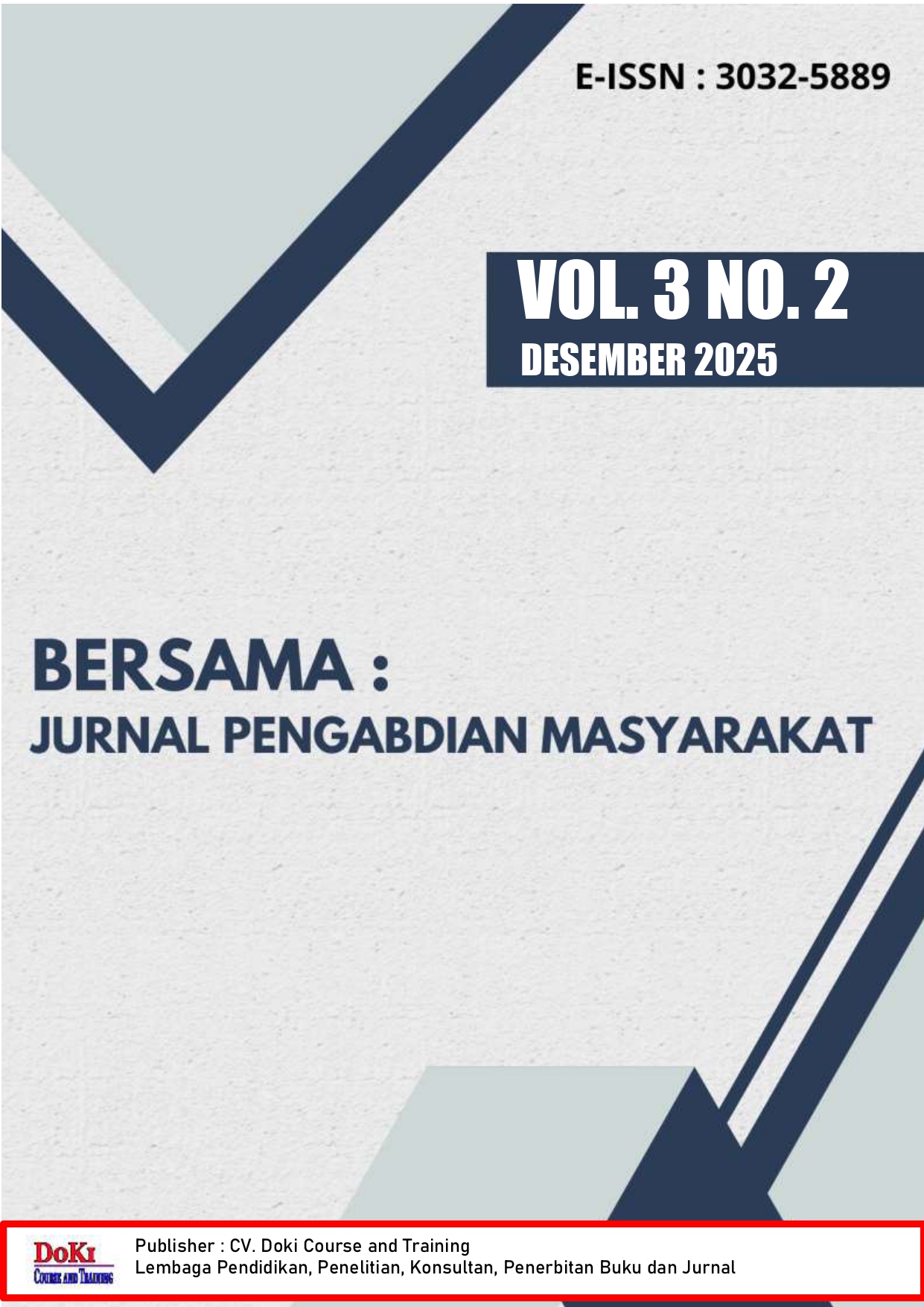Building A Madani Person (Becoming Independent, Creative and Innovative) at LKSA Muhammadiyah Nanggulan Orphanage, Kulon Progo
DOI:
https://doi.org/10.61994/bersama.v3i2.1285Keywords:
Community, Independent, Creative, InnovativeAbstract
The purpose of this PKM program is to help partners overcome existing problems in the form of financial and mental problems. The problems experienced by partners are (1) mental health, difficult conditions make partner children feel less confident in their potential, and confused about their future, (2) economic independence, partners still depend on donations given by donors in meeting their daily needs. The solution provided is to empower the community by: (1) education related to character education, (2) education related to fostering interest in entrepreneurship from an early age, (3) education related to financial management for children; so as to achieve an independent, creative and innovative person. The results obtained from this program are: partners show high motivation to compete; have the ability to make decisions and deal with problems that arise; have a strong sense of confidence and responsibility; realize the importance of creating jobs and how to develop an entrepreneurial spirit from an early age; partners also have an understanding of how to keep simple records and save money to live fruitfully.
References
Adiputra, IG, & Budiman, J. (2023). BUILDING AN INDEPENDENT AND CREATIVE SPIRIT IN ENTREPRENEURSHIP FOR MEMBERS OF THE BUMI MANDIRI SEJAHTERA COOPERATIVE IN PASIR KALIKI VILLAGE, NORTH CIMAHI DISTRICT. Serina Abdimas Journal, 1 (4), 1548-1553.
Aflah, AN, Ananda, R., Surya, YF, & Sutiyan, OSJ (2023). Efforts to Improve Creative Thinking Skills Using the Project-Based Learning Model in Elementary School Students. Autentik: Journal of Elementary Education Development, 7 (1), 57–69. https://doi.org/10.36379/autetik.v7i1.276
Afriani, O., Salam, M., & Usmanto, H. (2021). The role of orphanages in instilling character education in foster children. Journal of Citizenship, 5 (2), 539-551.
Angreni, WON, Rahagia, R., Setyawati, A., Kamaruddin, MI, & Suprapto, S. (2024). Community participation in clean and healthy living as an effort to improve the quality of health. Abdimas Polsaka, 3 (1), 1–6. https://doi.org/10.35816/abdimaspolsaka.v3i1.60
Aziz, RMJ, Tirkaamiasah, T., & Sudirja, J. (2025). Strengthening digital financial literacy in orphanage students. Berdesa: Journal of Community Service, 1 (2), 94–102. https://doi.org/10.47431/bds.v1i2.477
Yogyakarta Special Region Social Service. (2019). Summary of Orphanages in DIY Registered at the DIY Social Service Based on Service Type 2018 – SOCIAL SERVICE. http://dinsos.jogjaprov.go.id/?wpdmpro=rekap-panti-asuhan-diy-berdasarkan-jenis-pelayanan-2018 .
Fardiansyah, H. (2022). Educational Management (An Overview of Formal Education) . Bandung: Idina Media Utama.
Guerrero, MSC, Fiallos, BGV, & Merlo, O.J.T. (2022). Tendencias del emprendimiento joven: Caso Emprende Joven Ecuador 2021. Universidad y Sociedad, 14 (2), 215–221.
Herman;, Rosmita;, and I. Ridho, "Empowerment of the Talang Mamak Tribe Community in Kelulut Honey Cultivation in the Bukit Tigapuluh Indragiri Hulu National Park Area," Asket, vol. 6, no. 1, pp. 85–101, 2022.
Ho, M.-HR, Uy, MA, Kang, BNY, & Chan, K.-Y. (2018). Impact of entrepreneurship training on entrepreneurial efficacy and alertness among adolescent youth. Frontiers in Education, 3, Article 13. https://doi.org/10.3389/feduc.2018.00013
Huang, Q., Rehman, A., Zeeshan, M., & Ullah, I. (2022). Exploring the effect of In Situ Urbanization on Youth Entrepreneurship in Suburban Areas with low-medium development in China–a way forward to sustainable entrepreneurship mechanism. Frontiers of Environmental Science & Engineering in China. https://doi.org/10.3389/fenvs.2022.927918
Ibrahim, NN, Naidu, NBM, Shegaram, P.C., & Ahmad, N.S. (2024). Character education in the 21st century: A bibliometric analysis on 2000–2024 Scopus database. International Journal of Modern Education, 6 (22), 741–757. https://doi.org/10.35631/IJMOE.622049
Irwansyah, R. (2021). Student Development. Bandung: Widina Bhakti Persada.
Lestari, WA (2016). The Role of Child Welfare Institutions in Instilling Character Education in Foster Children in Orphanages. Journal of Civic Law, 1 (2), 84-88.
LKSA Muhammadiyah Nanggulan Orphanage. (nd). History - LKSA Muhammadiyah Nanggulan Orphanage. https://web.pantimuhnanggulan.org/
Marchesania, F., Masciarellia, F., & Doanbc, H. C. (2022). Innovation in cities a driving force for knowledge flows: Exploring the relationship between high-tech firms, student mobility, and the role of youth entrepreneurship. Cities, 130, 103852. https://doi.org/10.1016/j.cities.2022.103852
Maryati, S., Prasetyo, H., & Hidayat, M. (2025). Financial Literacy Introduction Training for Children at the Mahabbatul Ummi Orphanage. Indonesian Journal of Community Engagement, 1 (2), 98-100.
Ningrum, MA 2017. The Role of the Family in Cultivating an Entrepreneurial Spirit from an Early Age. Unesa Education Journal , 2. https://doi.org/10.26740/jp.v2n1.p39-43
Pusparadi, R., Saputri, AE, & Darmayanti, M. (2024). The Effectiveness of the Project Based Learning Model on Elementary School Students' Creative Thinking Skills. SAP (Educational Articles Compilation), 9 (1), 136–143.
Riyadi, S., Haetami, A., & Saputra, MD (2024). Developing Entrepreneurial Interest in Students at the Tahfidz Hidayah Orphanage. Journal of Economics Implementation: Community Service, 1 (2), 58-66.
Singh, B. (2019). Character education in the 21st century. Journal of Social Studies (JSS), 15 (1), 1-10
Sofyan, Y. (2020). The Role of Counseling by Advisor Lecturers in Increasing Student Learning Motivation at Private Universities in the LLDIKTI IV Region. Journal of Islamic Guidance and Counseling, 10 (2), 237–242.
Islamic Research and Studies Islamic Review, 4. https://doi.org/10.35878/islamicreview.v6i1.121
Taufek, M. (2024). The Effect of the Project-Based Learning Model on Creative Mathematical Thinking Skills in Elementary Schools . SENTRI: Scientific Research Journal, 2 (2), 426–430. https://doi.org/10.55681/sentri.v2i2.522
World Health Organization. (2024). Mental health. World Health Organization. https://www-who-int.translate.goog/news-room/fact-sheets/detail/mental-health-strengthening-our-response?_x_tr_sl=en&_x_tr_tl=en&_x_tr_hl=en&_x_tr_pto=tc
Downloads
Published
Issue
Section
License
Copyright (c) 2025 Zahro Varisna Rohmadani, Andhita Dyorita Khoiryasdien

This work is licensed under a Creative Commons Attribution-NonCommercial-ShareAlike 4.0 International License.
Licensing

This work is licensed under a Creative Commons Attribution-NonCommercial-ShareAlike 4.0 International License.









